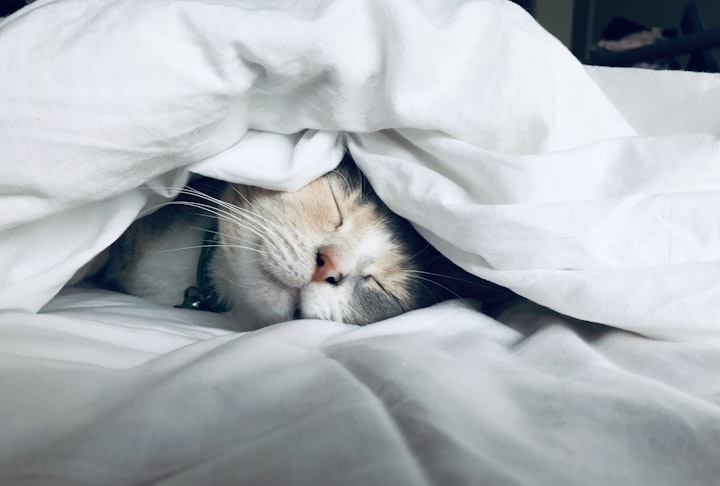Sleep Like a Baby
7 Things You Should Do Before Bed

Sleep is an essential part of life and getting a good night's rest is important for both physical and mental health.
Unfortunately, many of us struggle to drift off to sleep, leading to a frustrating experience of lying in bed for hours trying to quiet our minds. But there are some simple strategies that can help you fall asleep faster and make the most of your time in bed. In this article, we'll look at some tips on how to get a better night's sleep.
Are you struggling to fall asleep at night? Difficulty sleeping can lead to a number of physical and mental health issues, so it's important to make sure you're getting the restful sleep you need. Fortunately, there are several strategies you can use to help yourself drift off faster and enjoy a more restful night's sleep. In this article, we'll explore seven tricks that may help you nod off quickly and easily.
1. Sleep in a colder environment
Sleep is a vital component of our well-being, and the quality of our sleep can be greatly affected by our environment. It is important to understand the impact that temperature has on sleep and how to create an optimal sleeping environment.
Temperature plays a critical role in our sleep quality and can have a noticeable impact on how we feel the following day. The optimal temperature for sleeping is considered to be around 65°F (18.3°C). By keeping your bedroom at this temperature range, you can help ensure that your body has an easier time cooling down before bedtime.
When it comes to regulating your room's temperature, there are several strategies available. During summer months, fans and air conditioners can help maintain a cooler environment while still allowing good ventilation of the room. Investing in blackout curtains or window blinds with insulating properties may also help to reduce the amount of outside heat entering your bedroom.
2. Take a hot shower or bath before bed
Getting a good night's sleep is essential for our physical and mental health, and one of the most effective ways to ensure a restful slumber is to take a hot shower or bath before bed. By exposing ourselves to hot temperatures, we can trigger physiological changes in the body that help us fall asleep faster. In this article, we'll explore how taking a hot shower or bath before bed works, its potential benefits, and tips on how to make the most of this simple yet powerful technique.
Taking a hot shower or bath before bed is an easy, natural way to prepare for sleep. Hot showers and baths can increase the body's core temperature and trigger physiological changes that help us relax and fall asleep faster. When we are exposed to heat, our bodies send blood to the surface of our skin, causing it to flush. Stepping out of the warmth causes the blood vessels to radiate out inner heat, cooling our core temperature and signaling to our brains that it is time for sleep.
It is important to consider the temperature when taking a hot shower or bath before bed, as too hot can be uncomfortable and lead to more wakefulness.
3. Put away the clock
Sleep deprivation is a growing problem in modern life, but too often the focus is on quick fixes rather than long-term solutions. Today we look at one simple yet highly effective strategy for improving your quality of sleep: put away the clock. We examine why this seemingly small action can have a huge positive impact on your overall sleep health and well-being.
Sleep experts agree that a key component of restful sleep is the absence of stress and worry. When we are constantly monitoring the time, this can lead to increased levels of anxiety and arousal, making it harder for us to drift off into slumber. By putting away the clock, we can help reduce these negative feelings and emotions, allowing us to relax deeper into our sleep cycles.
It's important to note that this doesn't mean you should completely avoid looking at your clock or checking the time throughout the day. Rather, make sure that clocks aren't visible throughout your bedroom environment and keep them away from where you spend your most restful hours.
4. Minimize or avoid caffeine and nicotine
Good sleep is essential for our physical and mental wellbeing, and while there are many lifestyle changes we can make to promote better sleep, one of the most important is to minimize or avoid caffeine and nicotine. In this article, we will explore why it's so important to cut back on these stimulants in order to get a good night's rest.
Caffeine and nicotine are both stimulants that can affect our sleep patterns. Both substances increase alertness, boost energy levels, and make it more difficult to fall asleep. Caffeine has a half-life of around five hours, meaning that it takes up to eight hours for the body to metabolize the substance completely. Therefore, if you consume caffeine late in the afternoon or evening, you may be feeling its effects well into the night.
Nicotine is also a stimulant that can disrupt your sleep cycle. It has been linked to difficulty falling asleep as well as lighter, less restful sleep. Furthermore, when people try to quit smoking they may experience an increase in daytime fatigue and insomnia at night.
5. Exercise and be physically tired
Are you having trouble sleeping at night? Exercise can be an effective way to help improve your sleep quality, but it is important to understand how and when to exercise for the best outcome. In this article, we discuss how exercising can help you fall asleep faster, as well as strategies for timing your workouts in order to reap the most benefits.
One of the main benefits of exercise is that it can help you fall asleep faster and stay asleep for longer. This is due to the body releasing endorphins, which both reduce stress levels and help relax your body, as well as improve sleep quality. In addition to this, regular physical activity helps regulate your circadian rhythm, which is important for falling asleep at night.
However, it is important to consider when you exercise in order to reap the maximum benefits. Exercising too close to bedtime can actually make it harder for you to fall asleep. Experts recommend aiming to finish your workout 2–3 hours before bedtime in order to give your body enough time to cool down and relax.
6. Relax before bed
Sleep is a vital part of our overall health and well-being, yet many of us struggle to get the rest we need each night. Fortunately, there are simple steps we can take to help our bodies relax before bed and prepare for a good night's sleep. In this article, we will explore how engaging in quiet activities like reading can help us relax and wind down before bedtime.
It is important to note that the activity you choose should not be overly stimulating. Watching a movie or playing video games may be enjoyable, but these types of activities are more likely to keep your mind active and interfere with the process of winding down before sleep. Reading is an ideal activity for relaxation because it allows us to escape into a peaceful world while also engaging our minds in a gentle way.
Reading can be done anywhere and at any time - even just before bed. Studies have shown that reading can help reduce stress levels and make it easier to fall asleep later on in the evening. It can also stimulate creativity and help improve our understanding of new concepts and ideas.
7. Get sun exposure during the day
We all know the importance of getting enough sleep, but did you know that the key to a good night's rest may lie in your exposure to sunlight during the day? Studies have shown that natural sunlight helps condition our bodies' internal clocks, providing us with a better sleeping pattern and ultimately improving overall quality of life. In this article, we'll discuss how much sun exposure is necessary for optimal health and how to get it without compromising nighttime sleep.
Sun exposure is an essential part of our daily lives, and it is important to find the balance between getting enough natural sunlight during the day and avoiding too much exposure at night. To achieve this balance, aim for 30 minutes of sun exposure during the day. This can be accomplished by taking a walk outside or eating lunch on a park bench if possible. During this time, make sure you wear sunscreen to protect yourself from harmful UV rays. Additionally, avoid bright screens late in the evening or before bedtime because they can disrupt your sleep cycle.
Getting a good night's sleep is essential for overall health and wellbeing. Unfortunately, many of us struggle to fall asleep quickly and easily. Fortunately, there are some simple strategies that can help you drift off faster, so that you can wake up feeling refreshed and energised. In this article, we will look at some proven tips for falling asleep faster.
About the Creator
Izabela Bąk
I'm a passionate business analyst.






Comments
There are no comments for this story
Be the first to respond and start the conversation.